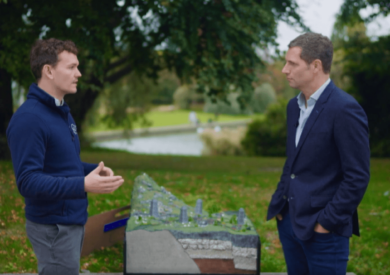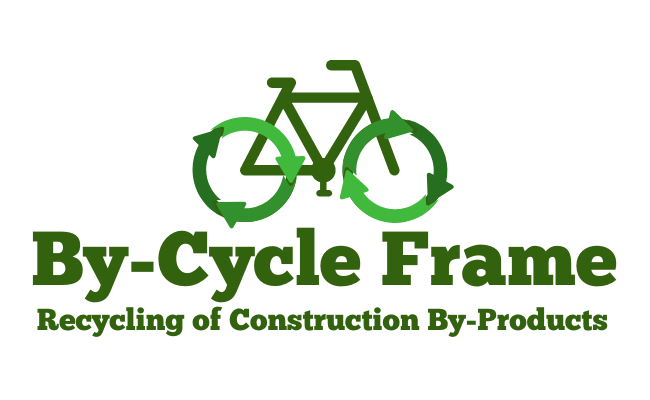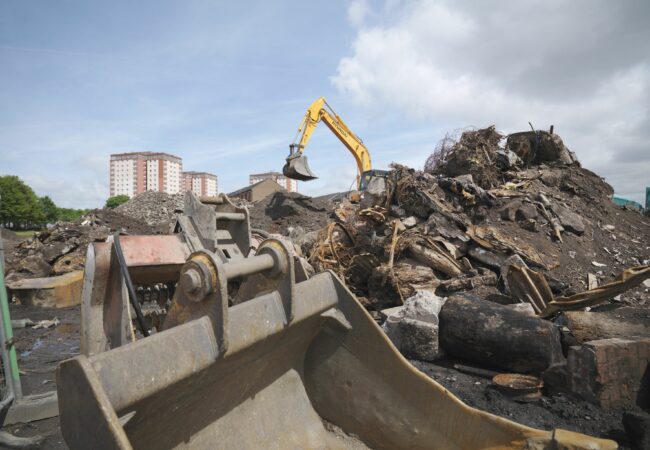
GEONORM
GEONORM will enable the decarbonisation of the heating sector with the sustainable replacement of hydrocarbon sources by a mix of renewable energy.
Find out more
This project will undertake comprehensive feasibility studies to examine both the opportunities and key challenges (practical, technical, economic, regulatory, environmental, etc.) to the use of construction by-products as nationally useful secondary raw materials. These studies will focus on specific by-products (e.g., crushed concrete) from the construction and demolition waste stream, which is the largest single source of waste in both Ireland and the EU, and use cases in civil works for Irish infrastructure projects (road, rail, utilities, etc.), which presents considerable potential for the prevention and recycling of such waste.

The waste produced by construction and demolition (C&D) activities is perhaps the most promising source of such material. C&D waste is the largest single source of waste in both Ireland and the EU, and offers a steady supply of concrete, soil, stone, wood, metal, plastic, and glass. With the global demand for engineering materials at an all-time high and predicted to double by 2050, there is an obvious opportunity to recover these materials for use in new construction projects.
Before Ireland can fully realise the potential of its C&D and other waste streams, however, there are practical, technical, economic, regulatory, environmental, and other challenges to be addressed. The project will focus on the production of robust, evidence-based recommendations to accelerate the use of C&D by-products as high-value secondary raw materials. The multi-disciplinary feasibility studies on construction and demolition by-products will seek to understand why these materials are being directed primarily to landfill.
This project is well aligned with the aims and objectives of the EPA Research Programme as outlined in the 2021 Action Plan and the EPA Research 2030 Framework. The findings from this study, and particularly the identification of the social, technical, and legislative barriers to greater uptake, will generate an evidence base which will allow the production of a set of policy recommendations applicable to a range of industries.
Along with the provision of timely policy recommendations, this project will also produce a prioritised list of potential pilot projects to encourage implementation by policy and industry groups. All results and data will be widely disseminated in an open access manner according to FAIR (findable, accessible, inter-operable, and re-usable) data principles thus supporting the development of open knowledge and data solutions.
As an innovation-focused SME, GDG are active in the development and delivery of EU-funded research projects. Given the transferability of the proposed research methodologies and the regional focus on supporting the development of a circular economy, the team are confident that the funding can be leveraged to participate in consortia for the upcoming Horizon Europe calls, thus further supporting the development of national environmental research capacity.

With Ireland and the EU now committed to achieving a circular economic model and net-zero carbon emissions, the reduction, re-use, and recycling of waste has become a key priority. The diversion or extraction of secondary raw materials from different waste streams offers several important benefits: less waste sent to landfill, reduced requirements for virgin materials, and lower carbon emissions as a result. Key solutions to the problem outlined above are listed below;
We are keen to engage with companies and individuals active in the Irish construction and demolition industry to further our understanding of how construction by-products are currently used, what challenges or blockers are faced in reusing materials, and what opportunities there are for expanding reuse of specific by-products from the construction and demolition waste stream.
For further information on how to get involved, please contact: